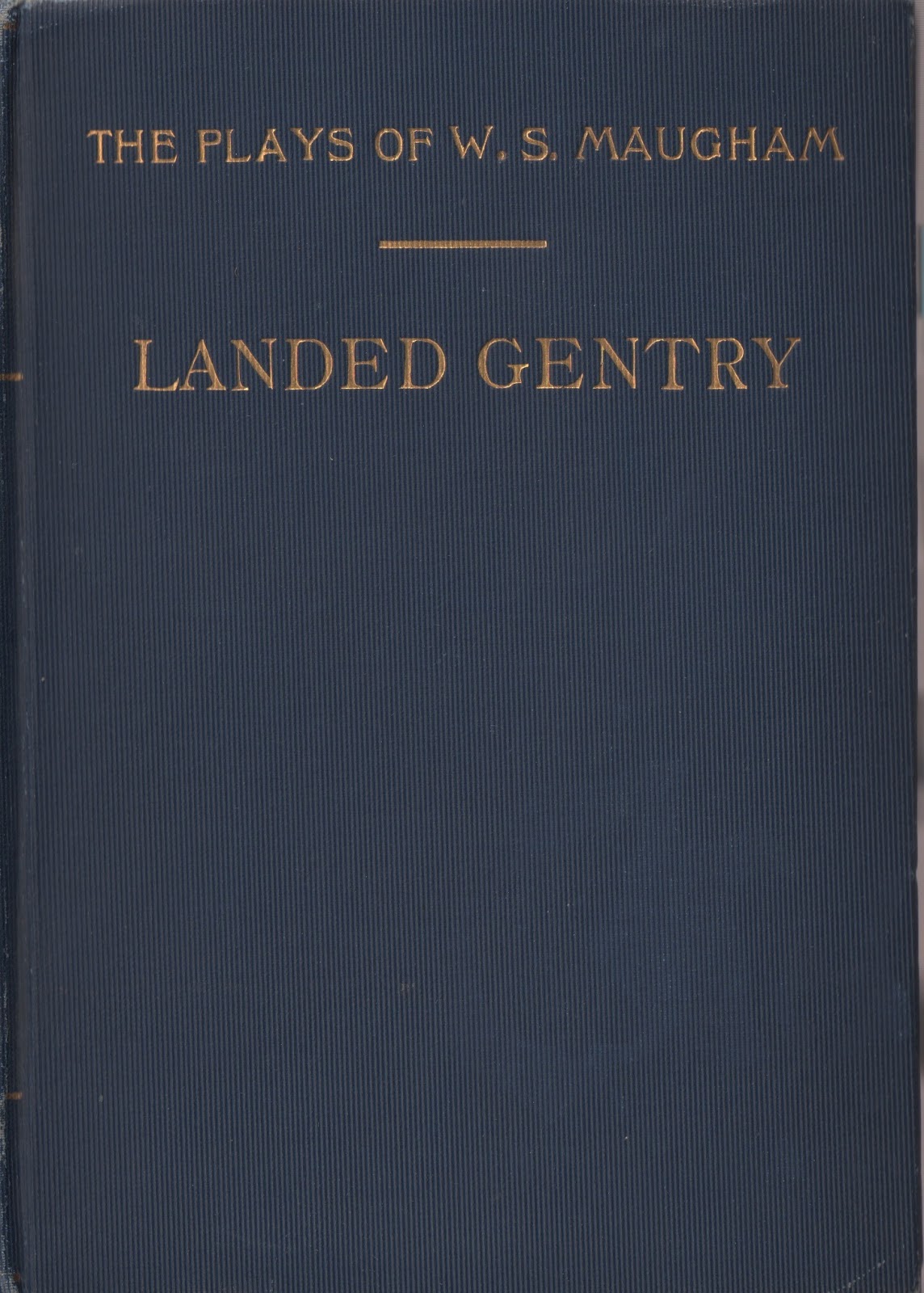Landed Gentry by W. Somerset Maugham
 |
| Landed Gentry - W. Somerset Maugham |
Landed Gentry. A Comedy in Four Acts (Chicago: The Dramatic Publishing Company, 1913)
This post is about a play by W. Somerset Maugham. I possess a different copy this time. Instead of the first edition published by Heinemann, I have the US edition for a change. Moreover, I will show at the end of this post some photos published in The Play Pictorial, which are of interest to look at.
Landed Gentry - Storyline
The play was written in 1910 and performed in the same year, on October 15, at the Duke of York’s Theatre as Grace. Like The Unattainable, it was performed under a gentler title and then changed to a more telling one in the published version. It is not included in the collected plays. I wouldn’t say this is one of my favourite plays by Maugham. According to him, it wasn’t a failure or a success.
Although presented as a “comedy,” there isn’t anything very funny about it. And there are four acts, which appear to be uncommon. Another four-act play by Maugham is Loaves and Fishes. I am not very familiar with drama though….
Grace Insoley is the discontented wife of Claude Insoley, a perfect gentleman who is deeply in love with her. Despite his love, she finds her life boring and she is constantly reminded of her lower social status by her formidable mother-in-law, Mrs. Insoley, who objects Grace violently because she would much rather that Claude marry Miss Vernon of Foley, a member of the landed gentry, who is in her turn in love with Claude.
Unable to do anything about the situation, Mrs. Insoley attempts to bring about the marriage between Miss Vernon with her other son, Rev. Archibald Insoley. However, this is a subplot which doesn’t carry out very effectively.
While Grace is trying to combat her discontent, a parallel plot is developing. The daughter of the game keeper of the Insoleys, Gann, is trying to plead with Claude to let his daughter, Peggy, who has disgraced herself by getting pregnant being an unmarried woman, stay on. Claude has to uphold the rule of the estate and his moral principle to protect the pure Grace, so he orders Peggy to go; and if she doesn’t, Gann will have to go too, even though he has been employed there all his life.
Grace pleads for Peggy, but Claude is unmovable. Knowing Claude’s main reason makes Grace so ashamed, because she is by no means as virtuous as Claude believes. She has been having an affair with Henry Cobbett and can hardly bear her guilty conscience of seeing Peggy and her family being turned out.
While struggling thus, she discovers her love for Claude. Then the news of Peggy’s suicide reaches the family. Grace feels the weight of her guilt. If she had made a resolution of making a clean breast of her adultery to Claude, perhaps Claude would have forgiven Peggy’s trespass. To remedy this and to prove the genuine love she begins feeling for Claude, Grace decides to tell him the truth, so they can start over.
At this point, the suspense is very well built up, and the reader worries about Grace’s decision. I imagine the effect on the audience would have been much stronger than on the reader. If Grace were to tell Claude, everything they have would be destroyed, although Grace’s conscience may be relieved for a moment. I am not going to spoil the ending for those who haven't read it.
The Landed Gentry - The Dramatic Publishing Company
This is the first edition from the Dramatic Publishing Company that I have and, although it is described in Stott, I am not quite sure whether this is the first edition.
For one thing, no year is given. I don’t know if it is typical of the publishing company, and I am not sure if it is ever reprinted. Not having seen another publication of the Sergel's Acting Drama I really can’t tell.
At the moment of writing, I haven’t found any Heinemann first edition on the market.
Grace - The Play Pictorial
 |
| The Play Pictorial - Grace W. Somerset Maugham |
The issue 100 of The Play Pictorial is devoted to Grace. It is an interesting magazine, full of photos of the staging and the characters. It is a great resource to see how the play looked like when it was first produced, the costume, the scene.
In the magazine, "Insoley" is spelt "Insole."
The followings are some of the pictures.
 |
| Dennis Eadie & Irene Vanbrugh as Claude & Grace Insoley |
 |
| The Drawing-Room at Kenyon-Fulton Grace by Somerset Maugham |
 |
| The most dramatic scene |
 |
| What should Grace do? |
An ebook of Landed Gentry can be found on the page Maugham's Plays.
Landed Gentry - US edition

Comments
Post a Comment